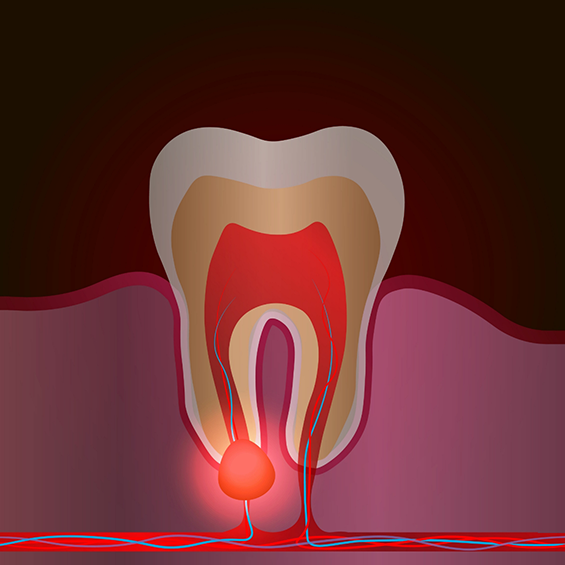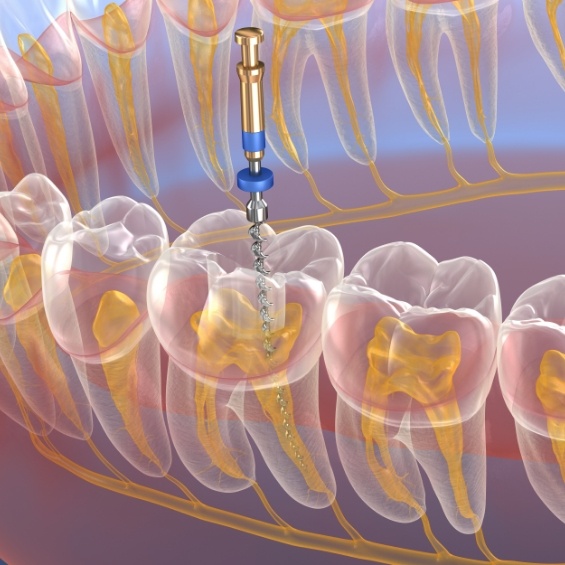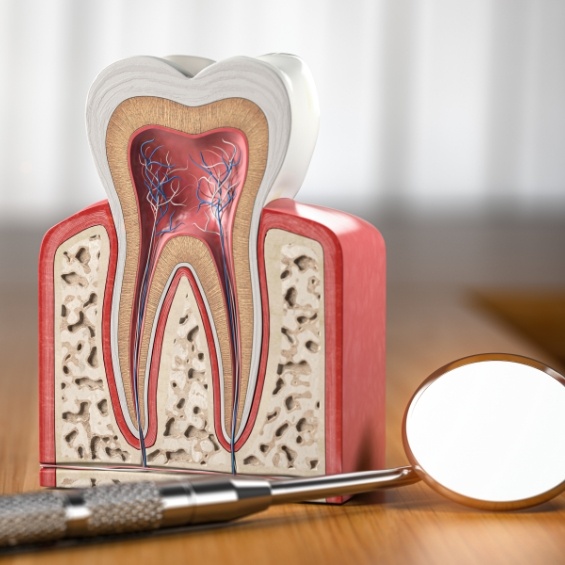Root Canal Therapy Greenwood
Erasing Pain & Preventing Tooth Loss
What do you do if you wake up in the middle of the night with unbearable tooth pain? The answer is to call your local emergency dentist in Greenwood at Tylan Creek Family Dentistry. Not only do we offer same-day emergency appointments, but our skilled team of dentists and multiple convenient office locations can help soothe your stress and discomfort. With countless years of experience under our team’s belt, we can help preserve your oral health and prevent worsening problems from developing. Call us today to schedule your appointment!
Why Choose Tylan Creek Family Dentistry for Root Canal Therapy?
- Convenient One-Visit Dental Crowns
- Same-Day Emergency Appointments
- We Accept & Maximize Dental Insurance
Signs You May Need Root Canal Therapy

While the most common sign that you need root canal therapy is a severe toothache, there are a variety of other symptoms associated with this treatment, including:
- Extreme and prolonged temperature-related tooth sensitivity.
- Sharp pain or discomfort when biting down or chewing food.
- Discoloration of a tooth.
- A pimple-like bump on the gums near the affected tooth.
- Swollen or purple-red gums surrounding a tooth.
- A tooth that has been aching for days has suddenly stopped being painful.
If you notice any of these, call us immediately so we can diagnose the issue at hand and keep it from getting any worse.
The Process of Getting a Root Canal

Root canal therapy typically takes place over the course of two visits to our office. First, we’ll treat the infection by clearing away any decayed dental structure and removing the pulp. Then, we’ll sanitize the inner chamber of the tooth to ensure that no harmful oral bacteria linger. To rebuild the structure of your tooth, we’ll place a malleable, putty-like substance in it, called gutta-percha. This will prevent bacteria from re-entering the inside of the tooth down the road.
During your second visit, your dentist in Greenwood will top off your treated tooth with a custom-crafted dental crown designed to look realistic. It will be made from a tooth-colored material like ceramic or porcelain, providing your tooth with added protection and support, all while making it virtually indistinguishable from surrounding teeth.
The Benefits of Root Canal Therapy

Receiving timely treatment with root canal therapy will provide you with a variety of benefits, such as:
- Prevention of dealing with missing teeth or needing tooth replacement treatments.
- Virtually pain-free treatment thanks to modern dental technology and anesthetic.
- A high success rate that allows countless patients to continue enjoying their natural teeth for the rest of their lives.
- Customized, aesthetically pleasing results that don’t highlight the dental damage.
Understanding the Cost of Root Canals

Even when a root canal can save your tooth, you should learn its price before you commit. How else would you know whether you could even afford the treatment? With that said, the cost of root canals varies; you must consult our dentists for a precise estimate. Our team will also strive to make your care more affordable, walking you through its price factors, dental insurance, etc. To learn more, please keep reading or call us today!
Factors That Can Affect Root Canal Cost

We must assess your tooth (or teeth) to confirm your root canal’s cost. Our team can check factors that impact treatment price that way, including:
- Tooth Type/Location – Often enough, a root canal’s price partly depends on which tooth needs it. Some teeth have more roots than others, so treating these pearly whites is more costly.
- Treatment’s Complexity – The more complex a root canal, the more expensive it becomes. A dentist must work hard to perform tricky ones, while simpler root canals are less intense and pricey.
- “Extra” Services – After a root canal, some patients need a dental crown or filling. Your treatment cost will rise if you get such services.
Is it Cheaper to Pull My Tooth?

A tooth extraction may have a low upfront price, but it isn’t the “cheaper” option in the long run. The removal work costs more overall than a root canal would.
Don’t forget that tooth loss (regardless of cause) has harsh side effects. Leaving it unchecked leads to “smile gaps” that alter your bite, tilt your other teeth, and worse. Harmful bacteria can also use those spaces as breeding grounds, putting you at high risk of tooth decay and gum disease. These points indicate that a tooth extraction has long-term expenses that can strain finances.
Unlike an extraction, a root canal has no severe side effects. It would just save your tooth and help you avoid costly complications. As such, you should opt for this treatment before an extraction becomes necessary.
Does Dental Insurance Cover Root Canal Treatment?

Dental insurance often does cover root canal treatment, as most plans see the procedure as a major one. That means your policy may cover up to 50-80% of its final cost, depending on its details. Just make sure you confirm your benefits before you commit; they may differ from the norm. If you want, our team will even help you contact your plan provider.
Other Options for Making Root Canal Treatment Affordable

Even without insurance, a root canal treatment can be affordable. You’d just need to rely on our practice’s helpful payment options. After all, the right one would let you save your tooth in a budget-friendly way.
At Tylan Creek Family Dentistry, we offer payment options like:
- Dental Savings Plan – You can join our dental savings plan by paying an annual fee. Among other things, this plan would give you a 20% discount on root canals.
- Flexible Financing – We proudly work with CareCredit, which lets patients pay for root canals (and other treatments) in monthly installments.
Rather than “break the bank,” let us help you navigate your root canal’s cost. All you need to do is visit our office!
Root Canal Treatment FAQs
How Long Does It Take to Recover from a Root Canal?
Recovery is different for everyone, but many patients are about to return to work or skill they day following their root canal treatment. If your job is physically demanding, you may want to take a few days off. This is because vigorous exercise can make the healing process take longer as it diverts blood from the site. You may experience some soreness during this time, but it should be manageable with your over-the-counter and/or prescribed pain relievers. During this time, stick to soft foods and chew on the opposite side of your mouth. Brush and floss like normal but be especially careful around your treated tooth.
Can I Eat Before a Root Canal?
If you are being sedated for your root canal treatment, you may be asked to fast for a few hours beforehand to reduce the risk of nausea caused by the sedative. If you aren’t getting sedation, it’s recommended that you eat a healthy meal at least a couple of hours before the procedure. Your mouth will be numb for a little while afterward, making it risky to eat. You should avoid alcohol 24 hours before your procedure because it can interact negatively with the local anesthetic used to numb your mouth.
How Long Do Root Canals Last?
Root canals have a remarkably high success rate. Most teeth that have been treated with root canal treatment go on to provide full chewing function for many years, of even a lifetime. The longevity of your root canal treatment depends on multiple factors, like the extent of damage to your tooth and how much time has elapsed between placing the temporary and permanent crown. To help your root canal last as long as possible, follow your dentist’s post op instructions and practice excellent oral hygiene.
Do I Still Need a Root Canal if My Toothache Went Away?
In some cases, you may experience a severe toothache that disappears out of nowhere. Since teeth are unable to treat themselves, this usually means that harmful bacteria have killed the nerve of the tooth to the point that it doesn’t feel pain anymore. However, this doesn’t mean that you are in the clear. Without root canal treatment or an extraction, the infection could spread to the surrounding areas of the mouth, resulting in additional pain. If your dentist needs a root canal, it’s best to schedule the procedure right away!
